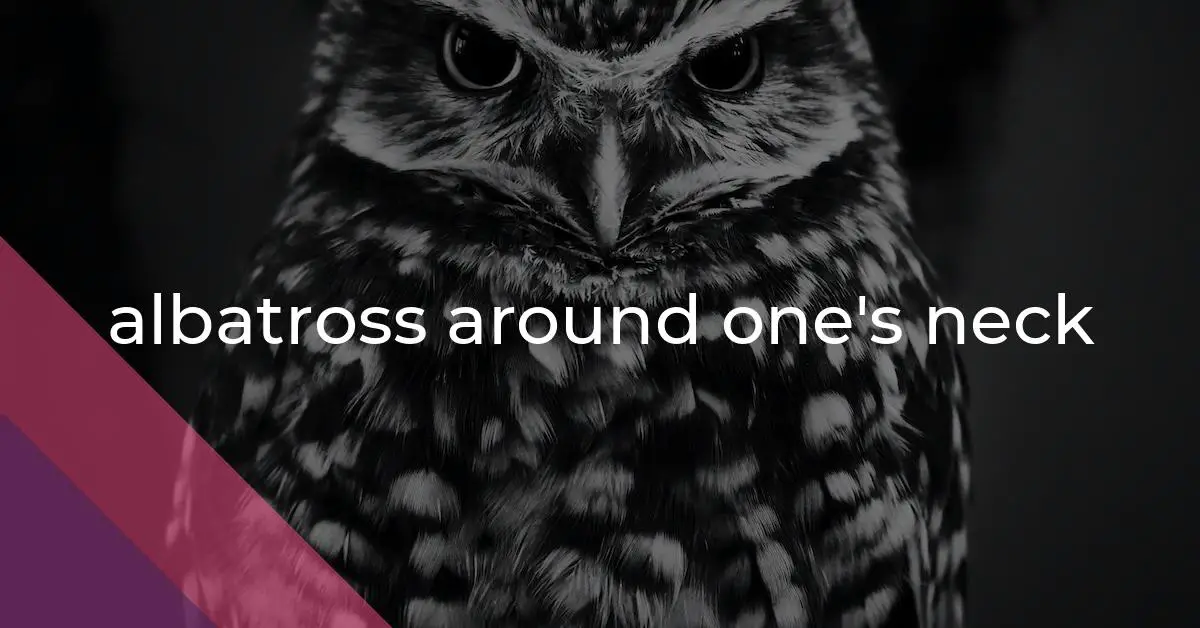albatross around one’s neck: Idiom Meaning and Origin
What does ‘albatross around one's neck’ mean?
The idiom "albatross around one's neck" refers to a burdensome or difficult problem or responsibility that one must carry. It originates from Samuel Taylor Coleridge's poem "The Rime of the Ancient Mariner." In the poem, the mariner shoots an albatross, which is seen as a sign of good luck, and the crew considers it a curse, thus leading to their suffering and the mariner's guilt.

Idiom Explorer
The idiom "hoist by one's own petard" means to be harmed or defeated by one's own actions or plans. It originates from a quote by Shakespeare's Hamlet, where a petard is a small explosive device that can blow up the person who set it.
The idiom "heavy as a dead donkey" means something that is extremely heavy and difficult to lift or carry, often used figuratively to describe a burden or a problem that is overwhelming.
The idiom "have the wolf by the ear" means to be in a dangerous or precarious situation, where letting go or holding on both pose a risk. It carries the idea of being trapped or caught in a difficult and risky position with limited options and potential harm.
The idiom "have someone's blood on one's head" means to be responsible or guilty for causing harm or death to someone.
The idiom "have one's hands full" means to be very busy or have a lot of work or responsibilities to deal with.
The idiom "have a tiger by the tail" means to be in a situation where one is trying to control or manage something that is too powerful or dangerous. It implies that one is struggling to maintain control and could potentially get overwhelmed or harmed.
The idiom "hang over one's head" means to have a pending or unresolved problem or worry that constantly occupies one's thoughts and causes anxiety or stress.
The idiom "hang heavy" means to feel burdensome or oppressive, often due to a sense of guilt or responsibility.
The idiom "hang by a thread" means to be in a very precarious or vulnerable situation, where failure or disaster is imminent.
The idiom "fall on one's sword" is used to describe taking responsibility for a mistake or failure, often by sacrificing oneself or accepting blame.
The Burden of a Curse
The idiom "albatross around one's neck" has its origins in Samuel Taylor Coleridge's poem "The Rime of the Ancient Mariner," published in 1798. In the poem, a mariner is punished for killing an albatross by being forced to wear its carcass around his neck. Over time, the phrase "albatross around one's neck" has come to represent a burdensome and debilitating situation or responsibility that hinders one's progress or success.
In the original poem, the albatross was seen as a symbol of good luck and was revered by the sailors. However, when the mariner kills the bird, it brings upon a curse that leads to the deaths of the entire crew except for him. As a result, the mariner is cursed to wander the seas with the albatross hanging around his neck.
Today, the idiom "albatross around one's neck" is used metaphorically to describe a constant source of trouble or guilt that one cannot escape from. It can refer to a personal or professional burden, such as a past mistake or a demanding task that weighs heavily on a person's mind or reputation. The phrase conveys a sense of regret, guilt, or shame.
Some related idioms to "albatross around one's neck" include "albatross round one's neck" and "Chinaman on one's back." These idioms have similar meanings and are used to describe burdensome or debilitating situations. Like "albatross around one's neck," they convey the idea of a constant source of trouble or guilt that hinders one's progress or success.
The idiom "albatross round one's neck" is similar to "albatross around one's neck" in that it represents a burdensome and debilitating situation or responsibility. The use of "round" instead of "around" in the idiom does not change its meaning significantly. It still conveys the idea of a constant source of trouble or guilt that hinders one's progress or success.
"Chinaman on one's back" is another idiom that is related to "albatross around one's neck." Both idioms describe burdensome and debilitating situations or responsibilities. The term "Chinaman" in the idiom is an outdated and offensive term, but it is still important to understand the historical context in order to fully grasp the meaning of the idiom. It represents a heavy burden that one cannot escape from, much like an albatross hanging around one's neck.
When using these idioms in conversation, it is important to be sensitive to their historical context and to consider the offensive nature of certain terms. It is always best to choose idioms and phrases that are inclusive and respectful to all individuals.
The idiom "albatross around one's neck" has its origins in Samuel Taylor Coleridge's poem "The Rime of the Ancient Mariner" and represents a burdensome and debilitating situation or responsibility. It conveys a sense of regret, guilt, or shame and is often used metaphorically to describe a constant source of trouble or guilt that one cannot escape from. Related idioms such as "albatross round one's neck" and "Chinaman on one's back" have similar meanings and convey the idea of a burdensome and debilitating situation. It is important to be mindful of historical context and to choose inclusive and respectful language when using these idioms in conversation.
Example usage
Examples of how the idiom albatross around one's neck can be used in a sentence:
- She saw the overdue assignment as an albatross around her neck.
- His addiction to gambling became an albatross around his neck, causing him financial ruin.
- Carrying the burden of her family's expectations felt like an albatross around her neck.
More "Metaphor" idioms



